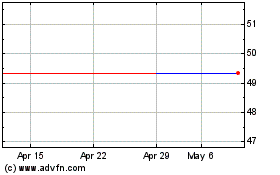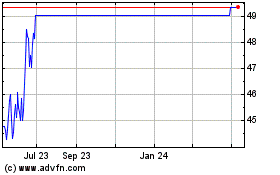Today's Top Supply Chain and Logistics News From WSJ
November 29 2017 - 7:22AM
Dow Jones News
By Paul Page
Sign up: With one click, get this newsletter delivered to your
inbox.
Tesla Inc.'s Semi electric truck is taking some unexpected
turns. Deutsche Post AG's DHL is the latest and biggest dedicated
transportation provider to kick the tires on the truck, WSJ
Logistics Report's Jennifer Smith writes, reserving 10 of the
vehicles and joining the growing list of operators taking the Semi
for a spin. Tesla is bringing the economic case for the truck into
tighter focus, saying it will list the vehicle for $150,000 for a
version with a 300-mile range -- not far off the price for a new
diesel-powered big rig -- and sell a longer-range edition for
$200,000. Tesla also boosted the price to reserve the truck from
$5,000 to $20,000, a sign of greater confidence in demand. DHL
Supply Chain's outlook may be more cautious. The company will use
the Tesla trucks for shuttle runs and same-day customer deliveries.
Like other operators reserving the trucks, the company will hold
back on the longer hauls that would test the truck battery's
ability to deliver.
Oil is starting to seep into the concerns over managing supply
chains. Oil prices have risen in recent weeks to levels not seen
since June 2015, the WSJ's Stephanie Yang and Alison Sider report,
pushing toward $60 a barrel and triggering higher costs from
shipping's bunker fuel to diesel prices for trucks. West Texas
Intermediate crude is up more than 36% from a low in June, and
resurgent global economic growth and forecasts of growing oil
demand have suppliers brimming with confidence. Fuel-dependent
transport operations are feeling the impact. In the U.S., average
diesel prices are nearing $3 a gallon, their highest level since
January 2015. Container shipping giant CMA CGM reported this week
its bunker bill in the third quarter soared 26% to $631 million.
Like energy providers, freight carriers believe customers can
absorb the higher prices as long as underlying demand remains just
as buoyant.
The scandal in Japan over faked quality data on industrial
suppliers is widening and taking in more transport operations.
Toray Industries Inc. says a manufacturing subsidiary falsified
information on materials used to strengthen car tires, the WSJ's
Sean McLain reports, and that irregularities hit shipments sent to
at least 13 companies. Toray textiles, including carbon fiber, are
used by car makers, airplane manufacturer Boeing Co. and clothing
companies like Uniqlo parent Fast Retailing Co., although the new
disclosure doesn't involve products for those companies. Toray says
its Toray Hybrid Cord unit rewrote product-quality data on
shipments of textiles used to strengthen automotive tires and
hoses, as well as textiles used in paper making. It's the latest
shock wave to hit manufacturing in Japan and undermine a national
reputation for quality. Automotive supplier Kobe Steel Ltd.
recently said it falsified quality data on aluminum used in cars
and other products.
ECONOMY & TRADE
A simmering trade battle between the U.S. and China over
aluminum is heating up. The Trump administration says it will
"self-initiate" an investigation into whether Chinese competitors
have illegally sold certain products below cost, the WSJ's Jacob M.
Schlesinger reports, an unusual step that comes with high risks and
potentially higher costs for U.S. aluminum users. Acting without a
complaint initiated by the private sector is aimed at accelerating
the process of imposing protective duties on "dumped" foreign
goods, and saving the industry costly legal fees. The Commerce
Department action is aimed at a product called "common alloy
aluminum sheet," and the U.S. imported some $603.6 million in such
metals last year. A final decision on whether to impose fresh
duties on Chinese aluminum is still months away, but the issue
could rattle business before that if market prices start rising or
if China heads to the World Trade Organization with its own
complaint.
QUOTABLE
IN OTHER NEWS
The Organization for Economic Cooperation and Development says
the global economy is on course for its best year since 2010.
(WSJ)
A measure of U.S. consumer confidence rose again in November,
hitting another 17-year high. (WSJ)
Home price growth accelerated in September as demand for homes
increased ahead of supply. (WSJ)
Emerson Electric Co. halted its effort to acquire fellow
industrial parts supplier Rockwell Automation Inc. (WSJ)
Siemens AG is readying a public share listing of part of its
medical equipment and services unit that could be worth up to $47
billion. (WSJ)
New allegations arose in a court case that Uber Technologies
Inc. tried to steal trade secrets from rivals and conceal its
actions from regulators. (WSJ)
Amazon.com Inc. is preparing to launch retail sales and
distribution in Israel. (Times of Israel)
U.S. Rep. Congressman Sam Graves (R., Mo.) wants to be the next
chairman of the House Transportation and Infrastructure Committee.
(The Hill)
The Cass Freight Index Freight for North American shipments rose
2.9% in October from a year ago. (Logistics Management)
British grocery supplier Palmer & Harvey ceased deliveries
and entered the U.K. equivalent of chapter 11 bankruptcy
protection. (The Independent)
Georgia's Port of Savannah added four gantry cranes capable of
handling the new generation of larger container ships. (Savannah
Morning News)
Maersk Line plans to build more inland container freight
handling stations in India. (Economic Times)
Zodiac Maritime ordered five ships with 11,000-containers
capacity apiece to be chartered to Hyundai Merchant Marine. (Splash
24/7)
Supply-chain software company Logility acquired analytics
specialist Halo Business Intelligence. (Modern Materials
Handling)
San Diego-based autonomous truck-technology company TuSimple
raised $55 million in a Series C funding round. (American
Shipper)
Cargo traffic for Asia-Pacific airlines rose 5.8% in October
from a year ago. (Air Cargo World)
British designer Stella McCartney called for changes in
"incredibly wasteful and harmful" apparel supply chains. (The
Guardian)
Industrial distributor Fastenal opened a museum on its own
origins in Winona, Minn. (Winona Daily News)
ABOUT US
Paul Page is deputy editor of WSJ Logistics Report. Follow him
at @PaulPage, and follow the entire WSJ Logistics Report team:
@brianjbaskin , @jensmithWSJ and @EEPhillips_WSJ. Follow the WSJ
Logistics Report on Twitter at @WSJLogistics.
Write to Paul Page at paul.page@wsj.com
(END) Dow Jones Newswires
November 29, 2017 07:07 ET (12:07 GMT)
Copyright (c) 2017 Dow Jones & Company, Inc.
Deutsche Post (PK) (USOTC:DPSGY)
Historical Stock Chart
From May 2024 to Jun 2024

Deutsche Post (PK) (USOTC:DPSGY)
Historical Stock Chart
From Jun 2023 to Jun 2024
